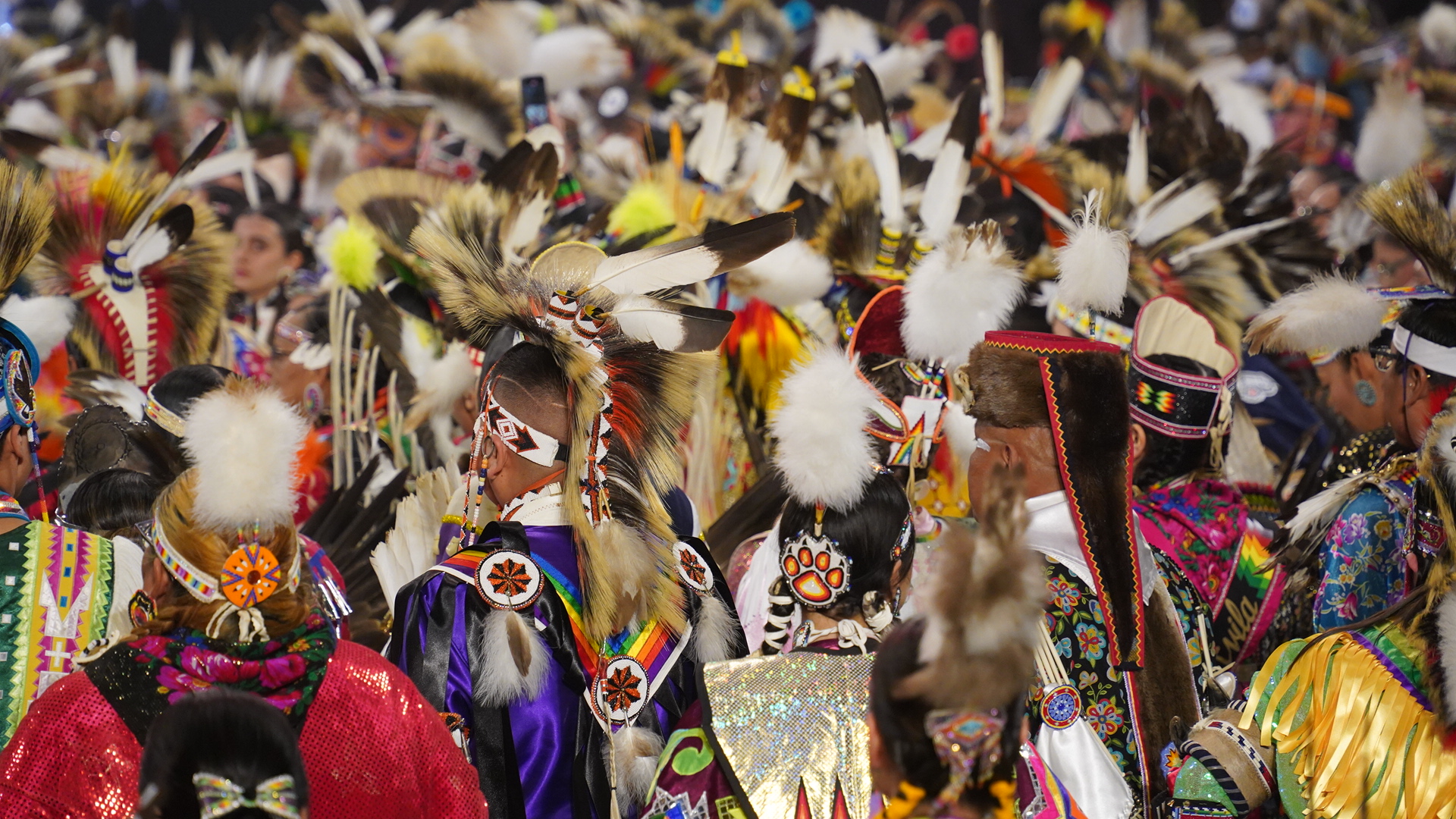
- Details
- By Darren Thompson
ALBUQUERQUE— The Gathering of Nations (GON) Powwow hosted its 40th annual event this weekend to crowds in the tens of thousands.
Organizers coin the event as North America’s largest powwow, and this year’s tally of registered dancers reached more than 3,000, representing hundreds of tribes from the United States and Canada.
The Powwow competition’s purse included more than $200,000 in cash prizes. Host drums for this year’s powwow were Showtime as the Northern Drum from Rapid City, S.D., and Cozad from Hog Creek, Okla. as the Southern Drum.
Dennis Bowen, Onondaga of Salamanca, N.Y., has been announcing the powwow for more than 30 years and said that one thing has remained constant: growth.
“It keeps getting bigger and bigger every year,” Bowen told Native News Online.
Since its inception in 1983 as a small powwow at the University of New Mexico (UNM), the Gathering has grown into a destination event.
From 1986 to 2016, the powwow hosted sell-out crowds at the UNM Basketball Arena known as “The Pit,” with a seating capacity of more than 20,000. In 2017, the powwow moved to the Tingley Coliseum located on New Mexico State Fairgrounds. Today, it is Albuquerque’s second-largest annual event and generates more than $20 million for the region.
Saturday’s grand entry featured appearances by comedian and Cheech Marin, the cast of “Reservation Dogs,” including Dallas Goldtooth, D’Pharaoh Woon-A-Tai, and Paulina Alexis, and a sold-out crowd of more than 11,000 attendees.
 Grand Entry at the 40th Annual Gathering of Nations Powwow at the Tingley Coliseum in Albuquerque, N.M. on Saturday, April 29, 2023. (Photo: Darren Thompson)
Grand Entry at the 40th Annual Gathering of Nations Powwow at the Tingley Coliseum in Albuquerque, N.M. on Saturday, April 29, 2023. (Photo: Darren Thompson)
With more than 30 dance categories and specials sponsored by different families, the powwow proceeded as scheduled until well after midnight each day.
Since 1984, the Gathering has hosted Miss Indian World competition — billed as the largest and most prestigious cultural title for young Indigenous women between 18 and 25. The competition is a juried four-day competition where women showcase their tribes and cultures to a panel judging them on public speaking, traditional talent, live interview, written essay, and dance.
Outside of the powwow arena, the event included food vendors selling roasted corn, Indian tacos, frybread, coffee, green chili cheeseburgers, art and business vendors, Stage 49, and a horse parade each day.
This year’s Miss Indian World competition was the largest in the event’s history, with 27 contestants representing tribes from the United States and Canada. On Sunday, April 29, Tori McConnell of the Yurok and Karuk Tribes of California was crowned the 2023-2024 Miss Indian World. As Miss Indian World, McConnell will travel around North America to powwows, workshops and festivals as a cultural ambassador representing Indigenous and First Nations Tribal culture.
The powwow’s final event was the singing competition, which had two singing categories, Northern and Southern and saw singers judged on their song choice, unison of singing, and use of lead singers for each verse of the song. Cree Confederation of Frog Lake, Alberta, won the Northern singing competition, and Cozad of Hog Creek, Okla., won the Southern singing competition. Both won $10,000 and a world championship title and trophy.
More Stories Like This
Two Indigenous Group Exhibits Opening January 9, 2026 at WatermarkWatermark Art Center to Host “Minwaajimowinan — Good Stories” Exhibition
Museums Alaska Awards More Than $200,000 to 12 Cultural Organizations Statewide
Zuni Youth Enrichment Project Takes Top Emerging Artist Apprentices to Phoenix for Artistic Exploration and Cultural Immersion
From Dishwasher to Award-Winning Chef: Laguna Pueblo's Josh Aragon Serves Up Albuquerque's Best Green Chile Stew
Help us defend tribal sovereignty.
At Native News Online, our mission is rooted in telling the stories that strengthen sovereignty and uplift Indigenous voices — not just at year’s end, but every single day.
Because of your generosity last year, we were able to keep our reporters on the ground in tribal communities, at national gatherings and in the halls of Congress — covering the issues that matter most to Indian Country: sovereignty, culture, education, health and economic opportunity.
That support sustained us through a tough year in 2025. Now, as we look to the year ahead, we need your help right now to ensure warrior journalism remains strong — reporting that defends tribal sovereignty, amplifies Native truth, and holds power accountable.
 The stakes couldn't be higher. Your support keeps Native voices heard, Native stories told and Native sovereignty defended.
The stakes couldn't be higher. Your support keeps Native voices heard, Native stories told and Native sovereignty defended.
Stand with Warrior Journalism today.
Levi Rickert (Potawatomi), Editor & Publisher

